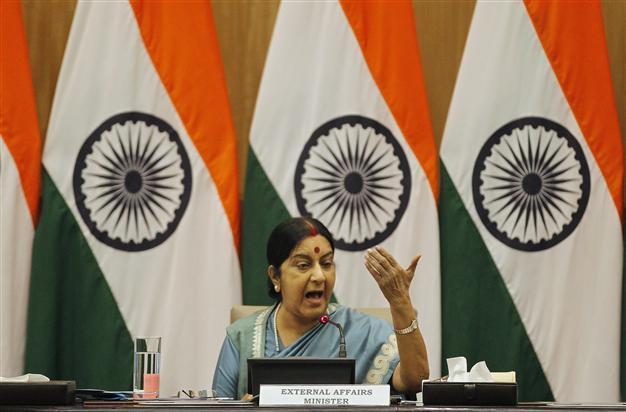India, Pakistan blame each other for cancellation of talks
NEW DELHI - The Associated Press

India's External Affairs Minister Sushma Swaraj answers questions to journalists during a press conference in New Delhi, India, Saturday, Aug. 22, 2015. AP Photo
India and Pakistan blamed each other for the cancellation of talks between their national security advisers that were scheduled for this week, with the rivals squabbling over the agenda.The meeting scheduled for Aug. 24 in New Delhi would have resumed dialogue between the nuclear-armed neighbors a year after India canceled talks because Pakistan had consulted with Kashmiri separatists.
"The cancellation of talks at the level of the national security advisers is unfortunate. It's Pakistan which has canceled the talks and not India," Indian Home Minister Rajnath Singh told reporters on Aug.23, adding that the possibility of any future dialogue would depend on Pakistan.
Pakistan's foreign ministry issued a statement late Aug. 22 rejecting India's suggestion to restrict the meeting to issues related to terrorism. Pakistan was keen on discussing the dispute over Kashmir and meet with Kashmiri separatist leaders.
Pakistan's national security adviser, Sartaj Aziz, did not travel to New Delhi on Aug. 23 as planned. He was scheduled to meet on Aug. 24 with his Indian counterpart, Ajit Doval.
Uncertainty about Aziz's trip began on Aug. 21 when India said it would not be "appropriate" for him to meet with separatist leaders from Indian-controlled Kashmir. Pakistan's high commissioner to New Delhi had invited Kashmiri leaders to meet with Aziz.
"It has been pointed out repeatedly that it has been a long-standing practice that whenever Pakistani leaders visited India during the past 20 years, they have been meeting (separatist) leaders," Pakistan's statement said. "It would be inappropriate for India to now impose the condition of changing this long-standing practice."
India accuses Pakistan of arming and training insurgents fighting for Kashmir's independence from India or its merger with Pakistan, a charge Islamabad denies. More than 68,000 people have been killed in the violence. India and Pakistan have fought two wars over their competing claims to Kashmir, and each administers part of it.
India's external affairs minister, Sushma Swaraj, said Aug. 22 that Aziz would be welcome if he agreed to limit his discussions to ending terrorism and violence.
"India would discuss the Kashmir dispute with Pakistan after the issue of terrorism is resolved," she told reporters.
Hours later, Pakistan's foreign ministry issued its statement, saying it had come to the conclusion that the proposed talks would not serve any purpose if conducted on the basis of the conditions laid down by Swaraj.
















